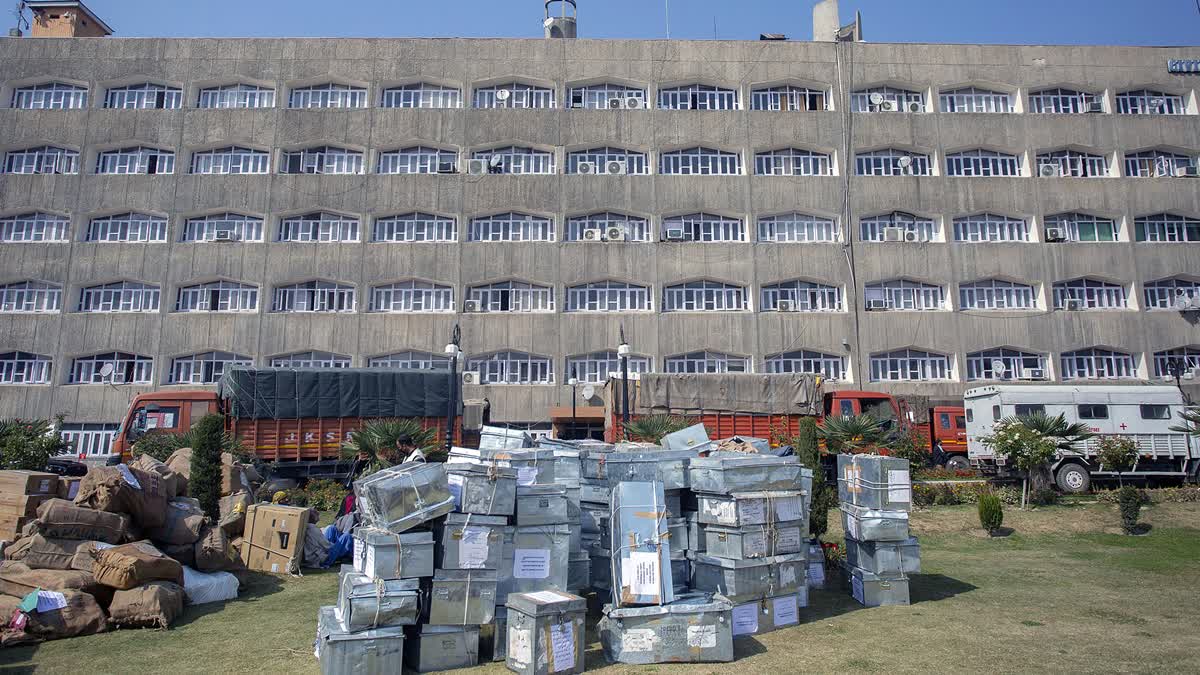Jammu: As the first assembly of the Jammu and Kashmir union territory is back in business, the traditional 'Darbar Move' is in the limelight again.
After the Article 370 was abrogated by the BJP government at the Centre on Aug 5, 2019, the Lieutenant Governor Manoj Sinha led government government in 2021, did away with the traditional 'Darbar Move', the bi-annual shifting of the civil secretariat from Kashmir to Jammu and vice versa in winter and summer respectively.
Now when the J&K UT gets its first elected government after the abrogation of Article 370, the demand to restore the traditional transfer of governance has grown shriller.
History
The history of Jammu and Kashmir's Darbar Move tradition dates back to the autocratic Dogra Rule and was reportedly started in 1872 by Maharaja Ranbir Singh, the third son of Raja Gulab Singh, the founder of the state of Jammu and Kashmir. The Maharaja would move his capital between Srinagar in summer and Jammu in winter to avoid extreme weather conditions in each region.
What is Darbar Move?
Under the Darbar Move, the state government functions in two capitals: six months in Srinagar and six months in Jammu. Jammu and Kashmir, which was previously a full state and is now a Union Territory, has two capitals: Jammu (the winter capital) and Srinagar (the summer capital).
During the harsh winter, the capital moves from Srinagar to Jammu, and in the summer, it shifts back to Srinagar. Specifically, the summer capital remains in Srinagar from May to October, while the winter capital stays in Jammu from November to April. This movement is known as the "Darbar Move."
As part of the Darbar Move, approximately 10,000 employees, including administrative secretaries, move along with files, computers, furniture, and other materials, requiring several trucks and costing crores of rupees.
Why Darbar Move Happens in J&K
There are two main reasons for the Darbar Move: adverse weather conditions and employee preferences. Many employees stationed in Jammu or Srinagar prefer to work from their own regions, which makes a permanent capital in one city challenging. If the capital were fixed in one place, employees from the other city might protest, which is why the government moves the capital twice a year.
The importance of Darbar Move
Jammu and Kashmir's climate contributed to the tradition, with Srinagar’s winter temperatures often being harsh and Jammu's summer temperatures being uncomfortable. Therefore, Maharaja Gulab Singh established the practice to make Jammu the capital in winter and Srinagar the capital in summer. However, as the 'Darbar Move' became increasingly complex and costly over the years, opposition to it grew.
Darbar Move 2021 Decision
In a significant administrative reform in Jammu and Kashmir, the historic 'Darbar Move' tradition, which dates back 152 years, officially ended in the year 2021.
In 2021, under the Darbar Move, all offices related to the Secretariat, Raj Bhavan, Police Headquarters, and other associated offices were scheduled to close in Jammu on April 24, with the capital moving to Srinagar on May 4. However, this 152-year-old tradition was paused, and employees continued working from their existing locations instead of relocating.
The Srinagar/Jammu Secretariat would remain operational, meaning there would be no move to Srinagar or Jammu of offices. At that time, the governor administration had said that move would save the government an estimated Rs 200 crore annually. Previously, the 'Darbar Move' involved shifting the state's administrative capital between Jammu and Srinagar every six months, requiring extensive logistical coordination and expenses.
This decision was met with opposition from various political parties, particularly the National Conference and Congress, People’s Conference, and People’s Democratic Party, which called for its reinstatement.
The Impact of Ending the 'Darbar Move'
The process of moving the government offices was a highly complex operation. Hundreds of trucks would transport furniture, files, computers, and records between the two cities, with buses shuttling government employees. Now, with the closure of the practice, the excessive expenditures will be eliminated.
Impact on Jammu economy
But after the cancellation of the Darbar Move practice, the bi-annual tradition of shifting the Jammu and Kashmir secretariat from one capital to another, has upset traders in Jammu as it would mean huge losses to them amid a battered economy hit by three consecutive lockdowns.
Traders in Jammu voiced their concerns, saying that the end of the bi-annual tradition would harm Jammu’s economy, especially in the winters when Darbar Move opening would boost the business. From October to March, thousands of Kashmiri people would throng the Jammu market.
Jammu traders said that the closure of the Darbar Move will end their business as thousands of families of employees from Kashmir would travel to Jammu and live in Jammu for winters.
Politics
The restoration of ‘Darbar Move’ was a big demand ahead of elections, especially from Jammu business bodies.
During the Jammu and Kashmir Assembly elections 2024, the ruling party National Conference had said if the national conference forms the government, the Darbar Move, which was abolished three years ago, would be reinstated. Now NC leader Omar Abdullah has taken office as the Chief Minister of Jammu and Kashmir, but the Omar Abdullah-led government issued an order on October 23 directing that all the UT-level heads of departments be asked to “ensure their availability at the Civil Secretariat in Jammu along with the Administrative Secretaries from November 11 onwards.“
This implies that the newly elected government has not taken any decisions so far about the restoration of the Darbar Move. However, several leaders from the national conference have said, including party president Farooq Abdullah, that the practice of the Darbar Move will be restored.
Read more:



